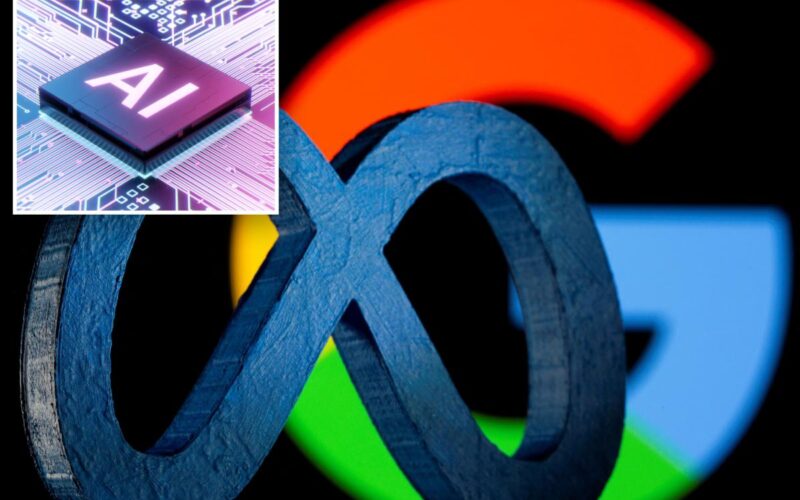Shares in chipmaker Nvidia sank about 4% Tuesday following a report that Meta is in talks to spend billions of dollars on chips from rival Google.
As part of the deal, Meta – the social media giant behind Facebook, Instagram and WhatsApp – would spend billions to use Google’s tensor processing units, or TPUs, in its own data centers in 2027, a person involved in the discussions told the Information.
The company is also in talks to rent Google chips from Google Cloud next year, the report stated.
Google could take as much as 10% of Nvidia’s annual revenue as a result of the deal, since Meta currently uses Nvidia’s graphics processing units, or GPUs, a person who heard the remarks told the Information.
That would equal billions of dollars in added revenue for Google, which is owned by Alphabet.
“Google Cloud is experiencing accelerating demand for both our custom TPUs and Nvidia GPUs; we are committed to supporting both, as we have for years,” a Google spokesperson told The Post in a statement.
An Nvidia spokesperson said the company is “delighted by Google’s success – they’ve made great advances in AI, and we continue to supply to Google.”
“NVIDIA is a generation ahead of the industry – it’s the only platform that runs every AI model and does it everywhere computing is done,” the spokesperson continued.
Meta did not immediately respond to The Post’s requests for comment.
GPUs are specialized chips that are the workhorses of AI, drawing billions of dollars in investment. Google’s TPUs are even more specialized chips and are “at the heart of some of Google’s most popular AI services, including Search, YouTube and DeepMind’s large language models,” according to the company.
Google has long rented out its AI chips to customers for use in Google Cloud data centers. But to better compete with Nvidia, it has been ramping up efforts to get companies like Meta to use Google chips in Meta’s own data centers, according to people involved in the talks.
The company has been marketing its TPUs as a cheaper alternative to Nvidia’s GPUs. Major Nvidia customers like Oracle have found it difficult to generate strong profit margins while shelling out so much capital to rent Nvidia chips.
Google said customers have been looking to work with them because they want higher security and compliance standards for sensitive data, a person with direct knowledge of the matter told the Information.
But catching up to Nvidia is no small feat. The chipmaker is dominant in the AI sector, with a staggering $4.2 trillion market cap – making it the most valuable company in the world.
Nvidia CEO Jensen Huang has been keeping a close eye on Google’s TPU progress and its talks with customers, so it is possible Nvidia could swoop in with a Meta deal before Google.
Google has been making strides in its AI units, though.
It released its biggest large language model, Gemini 3, earlier this month, quickly drawing positive reviews.
Meta has also been talking to Google about using its TPUs to train new AI models in a process known as inference, as opposed to just powering existing models, a person involved in the talks told the Information.
Analysts have argued that for anyone to really rival Nvidia, they will have to master chips for inference — “the ability of trained AI models to recognize patterns and draw conclusions from information that they haven’t seen before,” according to IBM.
Meta has also been developing its own chips for inference to save on costs and reduce its reliance on Nvidia, a source told the Information.
Google has developed software known as TPU command center that takes aim at Nvidia’s Cuba software, which is seen as an industry standard.
Major Nvidia customers have reportedly been reaping the benefits from Google’s advances.
After Google announced a deal to provide up to 1 million TPUs to Anthropic, Huang quickly revealed plans to invest billions of dollars into Anthropic.
When OpenAI announced plans to rent TPUs from Google, Huang signed a deal to invest up to $100 billion in OpenAI.








